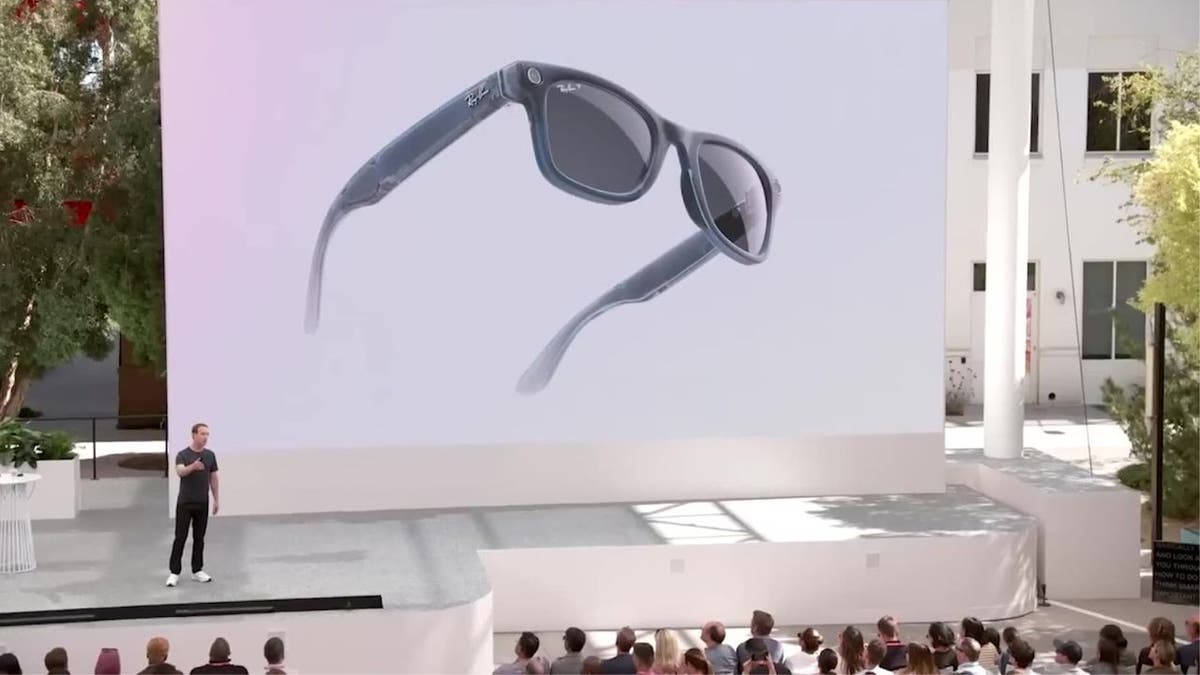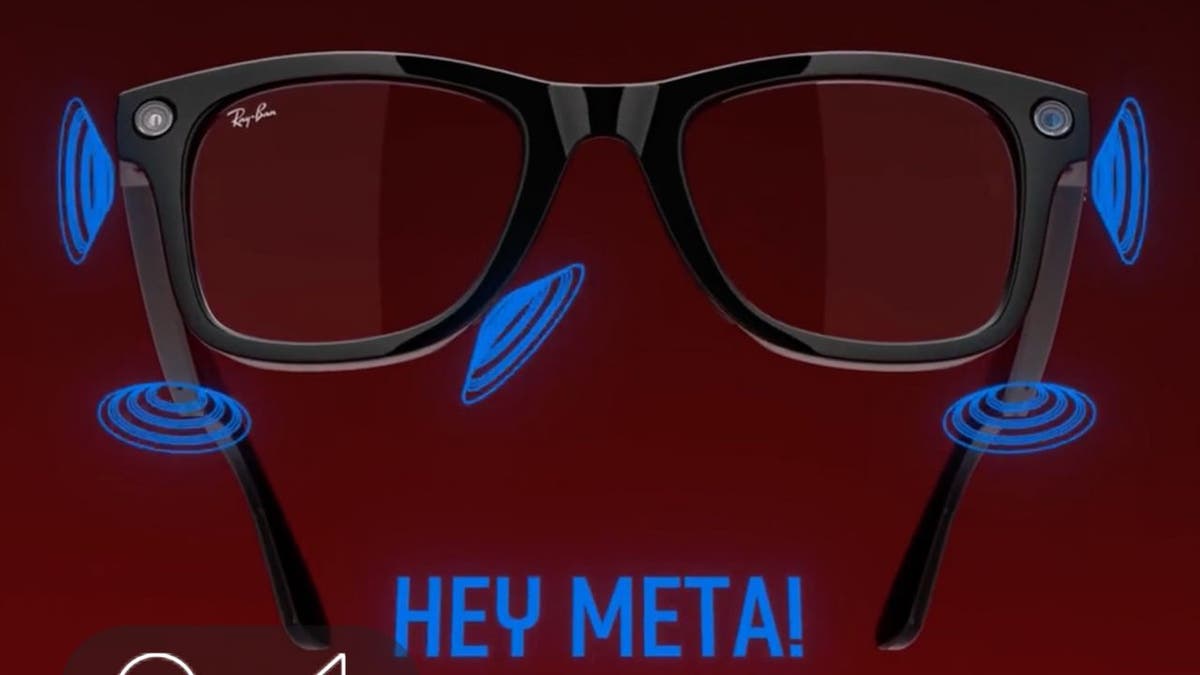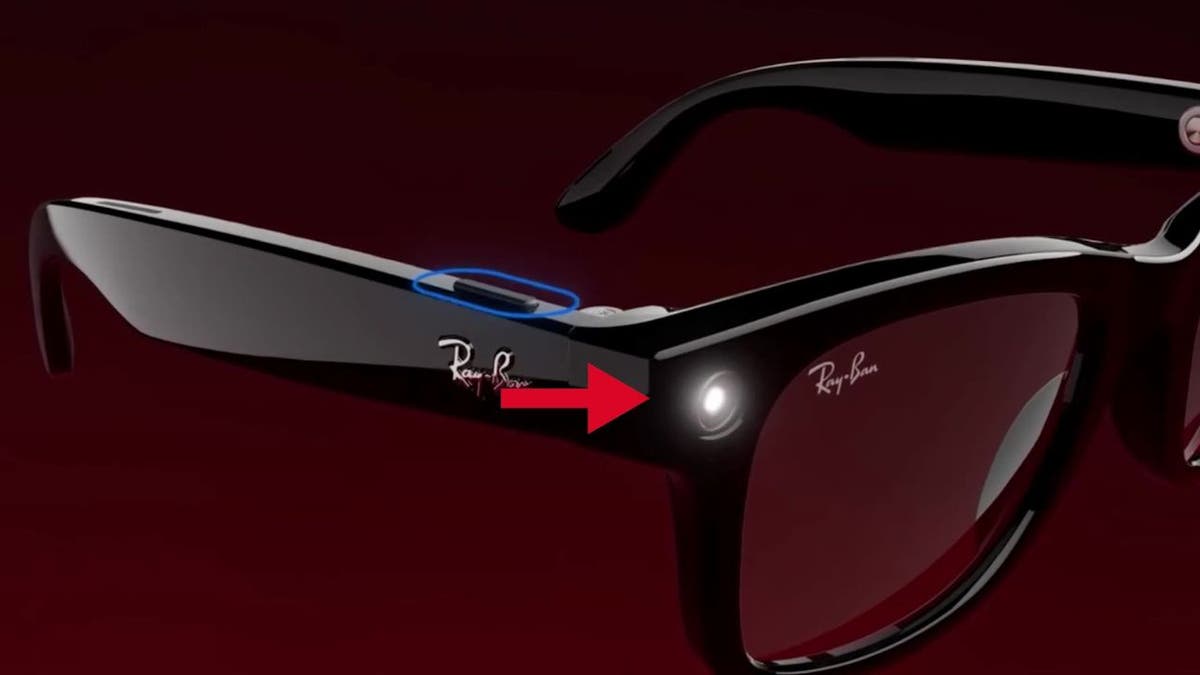Kurt "CyberGuy' Knutsson explains the Meta Ray-Ban smart glasses.
CyberGuy goes over the features of the smart glasses released by Meta and Ray-Ban.
You might think that sunglasses are just for blocking the sun or making a fashion statement. That’s not what Mark Zuckerberg envisions with the relaunch of Meta’s Ray-Ban smart glasses. The previous smart glasses version from the joint venture was a flop, failing to gain broad consumer traction.
A new way to connect or an invasion of privacy?
Zuckerberg is not giving up on his vision of creating a wearable device that can do more than just capture and share photos and videos.
The new smart glasses are designed to connect you to the metaverse, the virtual world that Zuckerberg believes will revolutionize social interaction with its Meta AI and live-streaming capabilities. But those capabilities also give creeps the ability to live video stream with the device's hidden cameras. Translation – you can be spied on and not even know it.
AMAZON SHOPPERS ‘BRIBED’ TO LEAVE POSITIVE REVIEWS

The new Meta Ray-Ban glasses have cameras that can do more than just take photos and video. (Meta)
MORE: THESE HIGH-TECH GLASSES WILL SUBTITLE REAL-LIFE CONVERSATIONS
The smart glasses by the numbers
The glasses, which cost $299 and look like regular Ray-Ban sunglasses, have two discreet cameras that allow you to capture photos and videos with a simple tap or voice command.
They also have a 12-megapixel ultrawide camera that can capture photos and videos in a 16:9 aspect ratio, which is more suitable for social media platforms. The camera also has enhanced stabilization and low-light performance.
As for the battery life, up to four hours on a single charge and an additional 32 hours with the charging case. The charging case is also 32% lighter than the previous version.
HOW WALMART IS USING AI TO CHANGE HOW YOU SHOP FOREVER

The glasses come with a charging case that powers the device for 36 hours of use. (Meta)
You can share photos and videos taken with the glasses on three platforms – Facebook, Instagram or WhatsApp – or store them on the cloud.
The glasses also have enhanced speakers that are 50% louder than the original glasses that came out in 2021 and let you listen to music, podcasts or phone calls.
They are available in different styles, colors and lens options, and you can customize them on the Ray-Ban remix platform.
MORE: IS SOMEONE SPYING ON YOU THROUGH YOUR HACKED WEBCAM?
How the smart glasses can translate and recognize anything you look at
What makes these glasses significantly different from the previous version that was launched in 2021 is the addition of artificial intelligence capabilities.
HOW ISRAEL’S D9R ARMORED BULLDOZER EARNED THE NICKNAME ‘THE TEDDY BEAR’

The Meta Ray-Ban glasses offer features using artificial intelligence. (Meta)
According to Zuckerberg, who unveiled the glasses at the Meta Connect 2023 event, the glasses will soon be able to do real-time language translations and object recognition.
META CONFESSES IT'S USING WHAT YOU POST TO TRAIN ITS AI

Mark Zuckerberg unveiling the glasses at Meta Connect 2023. (Meta)
For example, you could ask Meta AI how to fix a broken faucet that it sees through your lenses or what is the name of the flower that you are looking at.
WHY ISRAEL’S PEGASUS SPYWARE WAS NOT ENOUGH TO STOP HAMAS

The glasses use AI to offer its users features like translation. (Meta)
MORE: TOM BRADY, PARIS HILTON, SNOOP DOGG, AND KENDALL JENNER CHANGE THEIR NAMES FOR AI
How do I know if the smart glasses are recording?
The new Meta Ray-Ban smart glasses have a privacy LED light that indicates when they are recording. The light is located next to the right lens and is brighter and larger than the previous model. It is white in color and can be seen from the corner of your eye on the frame.
However, I found it hard to notice when the light was on. If motivated, anyone could take a Sharpie marker or tiny piece of electrical tape to block it from others seeing if the glasses camera is recording or livestreaming. Therefore, you might have to look closely at the glasses to see if they are on or ask the person wearing the glasses if they are recording.

The glasses come with an LED light that lets others know when the user is recording. (Meta)
GET MORE OF MY SECURITYTECH TIPS & EASY VIDEO TUTORIALS WITH THE FREE CYBERGUY NEWSLETTER - CLICK HERE
Critics raise privacy and ethical concerns over Meta’s Ray-Ban smart glasses
It's for this reason and more that critics have raised concerns about the invasion of privacy and ethical issues that these glasses pose. They argue that the glasses make it easy for people to record others without their consent or knowledge and that the data collected by the glasses could be used for malicious purposes by Meta or third parties. They also point out that the glasses could distract users from their surroundings and cause accidents or injuries.
The ghost of Google Glass
These are not new problems. In fact, they are similar to the ones that Google faced when it launched its Google Glass project in 2013. Google Glass was a pair of smart glasses that had similar features as Meta’s Ray-Ban smart glasses, but it failed to gain popularity and was discontinued in 2015. One of the main reasons for its failure was the backlash from the public, who thought that they were creepy.
HOW TO USE ‘VISUAL LOOK UP’ FEATURE ON IOS 17 TO FIND INFORMATION EASILY

Google Glass had similar capabilities as the Meta Ray-Ban glasses, but were discontinued. (Google)
MORE: NAOMI CAMPBELL ROCKS A SCREENLESS WEARABLE AI PIN WITH A SNEAKY SCI-FI TWIST
Kurt's key takeaways
Admittedly, Meta’s newest Ray-Ban smart glasses are much improved. Is the second or third time going to be a charm? Or will they be another flop that will be forgotten in a few years?
One thing is certain – they do have some pretty cool features, yet they also have the potential to be used by creeps to record you without your knowledge or consent.
How people use the glasses and how they respect other's privacy could ultimately determine their success. For me, whenever I see a pair of classic Ray-Bans looking my way, I’ll wonder if I’m being livestreamed by another social media addict desperate for attention.
Do you think they are a cool innovation or a creepy invasion of privacy? Would you buy them or avoid them? Let us know by writing us at Cyberguy.com/Contact
For more of my tech tips and security alerts, subscribe to my free CyberGuy Report Newsletter by heading to Cyberguy.com/Newsletter
CLICK HERE TO GET THE FOX NEWS APP
Answers to the most asked CyberGuy questions:
- What is the best way to protect your Mac, Windows, iPhone and Android devices from getting hacked?
- What is the best way to stay private, secure, and anonymous while browsing the web?
- How can I get rid of robocalls with apps and data removal services?
Copyright 2023 CyberGuy.com. All rights reserved.









































